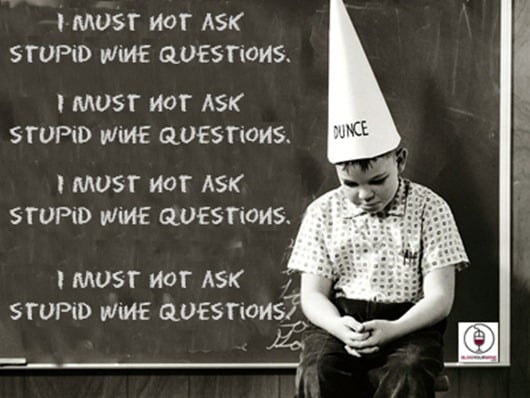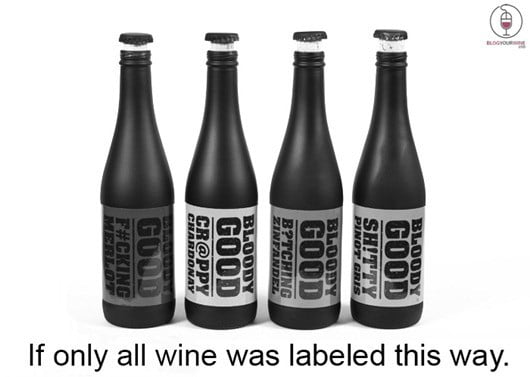
It’s often said that: “There are no stupid questions when it comes to wine!” but for the sake of this article, I’m going to disagree.
I HATE the word “good” when referencing wine i.e. “Oh, you’re a Sommelier? What’s a good wine?” is a question I get thrown at me just about every week. I can’t lie, it makes me want to impale myself onto a wine opener every time hear it! It’s probably the most ridiculous wine question you could ever ask! Seriously! But I’ll also go on record to say it’s probably the most frequently asked question…
Maybe I have too much time on my hands, but I often daydream about the number of times this same question has been asked around the world, and some of sarcastic responses I envisage:
Customer in a restaurant: “What’s a good wine? Recommend a good wine to me!”
Sommelier: “Well, what do you like?”
Customer: “I just want YOUR recommendation on a good wine.”
Sommelier: “Ok…I think the Petrus is a good wine. It’s $3000 a bottle. Would you like one?”
Customer: “WHAT!?!? Are you crazy!?!?! Besides, I just want a glass!”
Sommelier: “Alright, here taste this…it’s a Cabernet Franc from the Loire Valley. I love it. It’s a good wine.”
Customer: “Hmmmm, it’s ok, it’s not my favorite though….”
Sommelier: “But it’s a good wine. You wanted a good wine. MY recommendation on a good wine is this Cab Franc.”
Customer: “I’d like something with a little more fruit and not quite as dry.”
Sommelier: “So you asked for MY recommendation on a good wine…but you want more fruit and not as dry. Right, try this one then….it’s a Malbec from Argentina…”
Customer: “That’s not bad….did I mention I don’t drink red wine. I want it to be a white wine?”
Sommelier: <Proceeds to smash the customer over the head with the nearest decanter.>

We had a wine festival here in Jacksonville recently, and for the second time since I’ve lived here I was able to attend. It’s nice going to these things (since I haven’t been able to, with the number of hours I was pulling in the restaurant industry), even though fighting through the crowds to get a splash of wine is never fun! Luckily, since most of the guys pouring at these events (at least the ones in Jacksonville) know me on a personal level, so my “splash” is usually on the heavy side and it’s normally from a “secret stash” that has been kept hidden under the table.
Of course, when I get to the front of the line, I always ask the wine rep how the night has been going…and the response is ALWAYS along the lines of:
“Kris, I can’t wait for it to be over! It’s awful. If one more person interrupts me as I’m trying to tell them about a wine, and says ‘…just pour me two glasses of your best wine!’ I think I might scream!”
The moral to that story is, don’t EVER use the words “good,” “best” or “most expensive” at one of these wine events (at least towards someone who looks like they know what they’re doing).
If you do, just watch as their eyes glaze over and I promise you that inside their head they’re plotting your untimely demise. Instead, listen to what they have to say; and if you must, describe the type of wine you usually drink i.e. taste, body, sweetness etc.

To be truthful, I know what people are getting-at when they ask me to recommend a “good” wine. What they’re really thinking is that Sommeliers have SUCH a well-defined palate and so they MUST be the ultimate source for telling them what they should/should not be drinking. Not that I’m defending this question! If you discover someone is a mechanic by trade, do you ask them: “What’s a good car?” No. You don’t.
To me, a “good wine” must satisfy 5 primary points (listed in order of importance):
– A price that, when compared to the taste, would have lead you to believe it could/should be more expensive.
– An element of “excitement” and “complexity” that almost urges you to take another sip.
– A balance of fruit and savory notes (or primary and secondary elements, as I like to call them).
– An elegant and fairly extensive finish.
– A “sense of place” i.e. it tastes like where it comes from (a Chianti that tastes like a Chianti, not like a Napa Cabernet).
This isn’t an exhaustive list, certainly I could have easily thrown-in another couple of points, but I doubt very many people will disagree with me. The main problem people might have is how I have them ranked, especially the regarding the “sense of place.” For the record, the reason I have it ranked last is not to devalue the sense of place a wine should have; however, if a wine doesn’t really taste like where it came from, and all the previous points are satisfied, it probably won’t be a reason for you deeming it not to be “good.” Therefore, if a wine satisfies each one of the above points, you’ve got yourself a “good” wine! Of course that’s easier said than done! The above points are open to a hell of a lot of interpretation! My idea of “excitement” in a wine is probably vastly different than yours!

With that said, the points that I didn’t deem worthy of including in this list are:
– Have a great nose to it.
This isn’t necessarily relevant, as there are plenty of wines you’ll try where the initial smell will end-up deceiving you on the palate.
– Be from a good year.
Again, not important. Obviously once you start to get a little deeper into wine collecting, knowing the “good years” for a particular region can make or break whether the wine is cellar worthy. However, in the context we’re talking about, the vintage doesn’t play an important role. I’ve never refused to buy/open a bottle of wine which I planned to open for immediate consumption, simply because I didn’t like the year it was from.
– Have a great looking label.
This one should be kind-of obvious. There is no way that a wine label can influence what you taste…or can it? It always stuns people to know that I choose a lot of wines based on the label. What can I say!?!? I like cool labels on wines I haven’t seen before!!!
It, of course, isn’t my first-and-foremost tool used to judge whether the juice contained within that bottle is what I’m looking for, but I certainly think a label can influence your taste buds!
– Be cheap.
There is a big difference between a wine that is cheap and a wine that “drinks above it’s price point.” Cheap wine is easy to find. It’s every-bloody-where! You can no-doubt find wine for $5 a bottle, and it will, for the most part, taste like….wine. “Yup…that’s wine!” you might even say, after taking a sip.
– Be from a reputable producer / importer.
Certainly some wineries are better than others, the same goes for wine importers, but it isn’t a guarantee of quality by any means. I’ve had a lot of success in the past with one particular Spanish importer (who can obviously remain nameless), but I recently tasted some of his latest acquisitions and I thought they were sub-par. To evaluate a “good wine” based on the winery/importer is thinking a little-more “outside the bottle” than I think is necessary.


Helen Diehl
This was a GREAT post & very relevant to my job working in a wine store. Thanks Kris!
Kris Chislett
Thanks Helen! Even though I’ve been writing for a few years, I’m still finding my “true voice” online. Speaking my mind is one of those things I still have a hard time dealing with. :)
David
Hi, Sorry, but I think you are having a really wrong attitude, you should be glad about people asking you this “stupid” question. Ok, they can ask a more precise one from the beginning, but at least they are starting to be interested. If you you want to be perceived as a handy expert in the matter, it is sure they you are going to face a lot of “levels” of questions, mainly, in a specialized subject like this. Becoming a pro is demanding, and patience and the will to be supportive are few of the abilities that can take you in that path